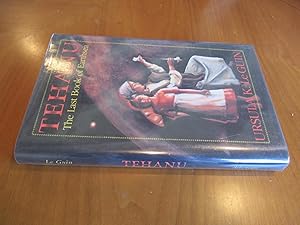

Unlike Ged's, Le Guin's power is undiminished. Yes, there are dragons but the human story and its meaning are primary here. Tenar is the central figure-nurturing Ged through his crisis of self-definition and establishing a new, earthly relationship with him and nourishing the Dragon-child Therru, who springs from a power as ancient, vital, and terrifying as life itself.

Together, the king, Tenar, and Therru hold the power and potential of what is to come. A just, new young king (who was Ged's companion in The Farthest Shore, 1972) has come to the throne, but evil still fills the land: as the story opens, Tenar (the young priestess of The Tombs of Atuan, 1971, Newbery Honor), now the widow of Farmer Flint, adopts a young child (Therru) who has been viciously abused and maimed by her own parents. The time is out of joint in Earthsea, but it will not be Ged-seeking a new raison d'etre while grieving his recently lost powers as Archmage and hiding from the animosity of minor wizards-who can set it right.


 0 kommentar(er)
0 kommentar(er)
